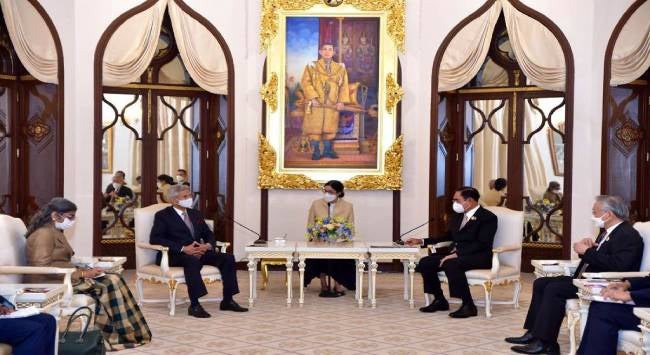Summary
At the ninth India-Thailand joint commission meeting from 16 to 18 August 2022, Indian External Affairs Minister, S Jaishankar, and his Thai counterpart, Don Pramudwinai, marked the 75th anniversary of diplomatic relations between India and Thailand. However, challenges remain in deepening bilateral relations as both parties face difficulties in handling their borders with Myanmar, slow progression in connectivity projects and navigating the strategic rivalry between the United States and China in the Indo-Pacific.
Preparations for the celebrations of the 75th anniversary of India-Thailand diplomatic relations began earlier this year with a logo design contest. In April 2022, the Permanent Secretary of Foreign Affairs of Thailand to India, Thani Thongphakdi, visited New Delhi to meet with the Secretary (East) of the Ministry of External Affairs, Saurabh Kumar, for the sixth Thailand-India Foreign Office consultations. Two months later, the Delhi Dialogue commemorated the 30th anniversary of dialogue relations between the Association of Southeast Asian Nations (ASEAN) and India. Before Indian External Affairs Minister S Jaishankar’s visit to Thailand for the ninth India-Thailand joint commission meeting from 16 to 18 August 2022, the second North East India festival was held in Bangkok.
Significantly, Jaishankar’s visit gave a new vital boost to the India-Thai relations where both parties signed two memorandums of understanding (MoUs) – one on health and medical research and the other on broadcasting cooperation. He also paid a courtesy call to Thai Prime Minister Prayut Chan-o-cha, where they discussed various matters. On the economic front, bilateral trade between Thailand and India reached the highest at US$15 billion (S$20.9 billion) in 2021-2022. Thailand is the fourth largest trading destination for India in the Southeast Asian region, while India is the top trade partner for Thailand in South Asia. Notably, Bangkok has signed a ‘mini-Free Trade Agreement’ with Telangana and plans to enter into more similar agreements with other Indian states, opening up opportunities to grow Thailand’s trade and investments with India.
As neighbours sharing the Andaman Sea as a maritime boundary, free shipping flow through the Malacca Straits is a strategic priority for India and Thailand. Since the first-ever naval exercise in the Andaman Sea in September 2019, with Singapore’s participation, naval cooperation between Delhi and Bangkok has increased. Both countries are also participants in RIMPAC, also known as the Rim of the Pacific, the world’s largest naval exercise. In defence, the launch of the Maitree military exercise in 2007 and the inking of a MoU on defence cooperation in 2012 have also strengthened the India-Thailand security ties.
Speaking to an audience at Chulalongkorn University, Jaishankar took the opportunity to articulate India’s vision for the Indo-Pacific region. He noted that India’s Indo-Pacific vision “builds on” its ‘Act East’ Policy and stressed that “India envisages the ASEAN to be at the centre of the Indo-Pacific, both literally and substantively”. Further, he reiterated the “Asian Century” and the necessity for China-India coordination, reflecting Delhi’s balancing diplomacy between Beijing and Washington. Although a member of the Quadrilateral Security Dialogue (Quad), Delhi seeks to maintain strategic autonomy, embracing Washington while maintaining connections with Beijing and Moscow. One exemplification is the recent agreement to participate in the Russian-led Vostok 2022 military exercise, which would also see China’s participation.
Bangkok concurs with India on the perception of the Indo-Pacific on the point of ASEAN centrality and its ‘Act West’ policy that Chan-o-cha has proposed to support India’s ‘Act East’ policy. As a US ally and China as its biggest trading partner in goods and arms, Thailand shares a balancing dilemma. Analysts have called for Bangkok to maintain impartiality in the United States-China rivalry and keep a balanced foreign policy.
Another shared concern is Myanmar. As neighbours to Myanmar, India and Thailand have remained relatively silent on the February 2021 coup, simply calling for restraint and a return to peace. The ongoing hostility within Myanmar has resulted in displacement across borders into India and Thailand. The sensitive political situation further complicates the hopes for early operationalisation of the India-Myanmar-Thailand Trilateral Highway (IMTT). The Indian proposal to extend the IMTT project to Cambodia, Laos and Vietnam, widely perceived as an alternative to the Chinese Belt and Road Initiative, might have to lie in wait for the return of political stability in Myanmar.
Moreover, the continued exclusion of Myanmar’s generals from ASEAN meetings has been condemned by the Tatmadaw, including the recent air raids in the Karen State near the Thai-Myanmar border, making cooperation difficult. India’s ‘twin-track’ approach to Myanmar and Jaishankar’s defence of Delhi’s relations with the military regime on “[managing] border relationship and the complexities of being a neighbour” reflect that continued engagement with Myanmar is the only choice.
Chan-o-cha is presently suspended from official duties due to an overstay of tenure. Over the recent years, opposition efforts and divide within his coalition have increasingly undermined his influence. The incoming tides of domestic political changes within Thailand are unlikely to impact bilateral ties with India. In the previous 2014 coup, the Delhi-Bangkok engagement continued, with the Narendra Modi government refraining from criticism.
Additionally, both Bangkok and Delhi share the overall vision for the centrality of ASEAN in the Indo-Pacific and the hope for more connectivity between Southeast Asia and South Asia. With Thailand assuming the chairmanship of the Bay of Bengal Initiative for Multi-Sectoral Technical and Economic Cooperation (BIMSTEC) this year, Delhi and Bangkok will have more opportunities to boost the BIMSTEC Master Plan for Transport Connectivity and discuss new frameworks to enhance trade and infrastructure connectivity.
. . . . .
Ms Claudia Chia is a Research Analyst at the Institute of South Asian Studies (ISAS), an autonomous research institute at the National University of Singapore (NUS). She can be contacted at claudiachia@nus.edu.sg. Mr Zheng Haiqi is a Non-Resident Fellow at ISAS. He can be contacted at zhenghaiqi@ruc.edu.cn. The authors bear full responsibility for the facts cited and opinions expressed in this paper.
Pic credit: S. Jaishankar’s Twitter
-
 More From :
More From :
-
 Tags :
Tags :
-
 Download PDF
Download PDF



